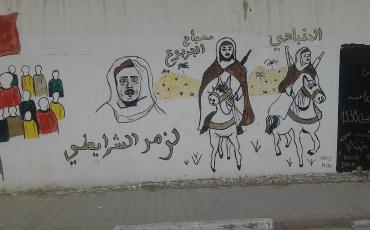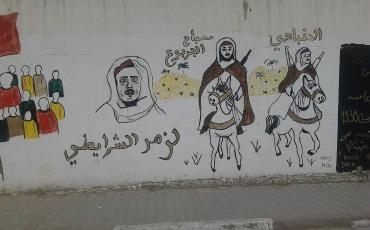Adverts by major Tunisian companies play with humor and stereotypes. Najla Mosbehi has analysed how three such advertisements are challenging hegemonic gender roles.
Imagine flipping through your favorite TV channels during Ramadan or enjoying the excitement of a World Cup match. Amidst laughter and catchy jingles, you might encounter advertisements that not only entertain but also challenge societal norms. In Tunisia, a vibrant shift is currently occurring in advertising, where humor is wielded as a tool to reshape hegemonial perceptions of gender roles. Notable examples include "Akkak Ya Mufida Akkak" from Orange Tunisia during Ramadan 2021, "Malla Jumhur Ya Baba" from Ooredoo Tunisia for the Qatar 2022 World Cup, and “Pub Danette Romdan 2024” from the food manufacturer Danette. These campaigns cleverly use humor to critique traditional stereotypes, inviting viewers to reconsider outdated notions and embrace a more equitable future.
Traditional Gender Roles in Tunisia
To fully appreciate the impact of these advertisements, it is essential to understand the traditional gender roles that dominate Tunisian society. The Code of Personal Status (CPS), established in 1956 under President Habib Bourguiba, aimed to improve women's rights by abolishing polygamy and granting equal divorce rights but could not fully eradicate gender inequalities rooted in societal norms. Despite legal advancements, Tunisian women still dedicate many hours of their day to housework—between five to twelve hours daily—while men contribute only about 45 minutes. This disparity highlights the ongoing impact of traditional role images on women's lives and underscores the relevance of medial contents that challenge these norms.
Societal Development
The portrayal of gender roles in these advertisements reflects a gradual cultural evolution within Tunisia, where traditional roles of man and woman have been challenged over time. Historically, Tunisian advertisements often reinforced conservative stereotypes by portraying women primarily as homemakers or caregivers. However, recent campaigns showcase women in empowered roles, suggesting a possible shift towards greater gender equality in Tunisian society.
The Role of Humor in Challenging Stereotypes
Humor is a powerful force in advertising, capable of connecting with audiences on a personal level. In Tunisia, brands are tapping into this potential to challenge and reshape traditional gender roles. The mentioned ads from Orange Tunisia cleverly turn stereotypes upside down, encouraging viewers to reconsider societal norms while keeping them entertained.
Women as Hip-Hop Singers
In the "Akkak Ya Mufida Akkak" advertisement, women are portrayed as hip-hop singers who are humorously engaging with their husbands: The protagonist points with her finger at her husband while singing, adding an assertive and playful dimension to her character. This representation challenges the stereotype of women as passive homemakers, instead showcasing them as confident individuals who express themselves freely.
A deeper analysis of the cinematic techniques used in these advertisements can further illuminate their intended impact. How do visual elements and narrative structures communicate messages about gender? In "Akkak Ya Mufida Akkak," vibrant cinematography captures the lively atmosphere of Ramadan celebrations while showcasing women as confident hip-hop singers engaging with their husbands. The use of bright colors and dynamic camera angles enhances the playful tone of the ad, making it both entertaining and thought-provoking.
Cultural critic Dr. Leila Ahmed emphasizes the importance of portraying women as multifaceted individuals in media, which reinforces their position as active contributors to society. Similarly, when women are depicted in such roles in advertising, it can have a profound impact on societal perceptions of them. This portrayal aligns with Ahmed's observations on how modern representations of Muslim women challenge traditional stereotypes by showcasing themselves off as empowered participants across various spheres of life.
Women Riding Horses
In the "Malla Jumhur Ya Baba" advertisement, women are shown riding horses while looking at men positioned at the bottom margin of the screen. This visual hierarchy emphasizes women's agency and challenges traditional portrayals of men as dominant figures. The dynamic cinematography captures the movement and excitement during World Cup celebrations. At the same time, it reinforces a message where women take on active roles rather than being mere spectators who are relegated to the background.
Shifting Consumer Roles
In the "Pub Danette Romdan 2024" advertisement, a man is depicted eating a Danette dessert while a woman studies and works on her computer. This marks a significant shift from traditional depictions where women are often shown solely as consumers or caregivers. Here, the woman is depicted as an active participant in professional life while the man enjoys a dessert and seems passive—an inversion of typical gender roles. This representation challenges the stereotype that confines women to domestic spaces and emphasizes their presence in professional environments. By juxtaposing leisure with professional ambition, this narrative challenges traditional gender roles typically depicted in domestic settings.
Tunisian advertisements of the last years highlight how humor can effectively challenge traditional gender stereotypes in Tunisia. The different Ramadan advertisement campaigns flip the script and invite viewers to rethink societal norms by showcasing women as confident and dynamic actors, rather than passive homemakers. With playful interactions and clever visual twists, they celebrate female empowerment and redefine consumer roles. These ads don’t just entertain; they spark conversations about gender equality that resonate well beyond the screen. In a world where laughter can drive change, these campaigns prove that humor is a powerful force in the fight for social transformation.



















